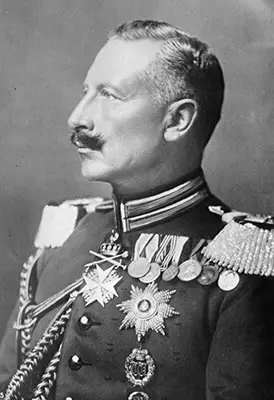Kaiser Wilhelm II
Kaiser Wilhelm II was born in January, 1859 in Potsdam Germany. His given name was Friedrich Wilhelm Victor Albert. His parents were Fredrick III of Germany Future Empress Victoria. His mother was the eldest daughter of Queen Victoria of England. Although he was born in Germany, his mother sought to establish a love of England in the young royal.
The young successor to the German throne endured a deformity of a withered arm. His shyness about his physical impediment was said to play into the future behavior of young Wilhelm. Apparently, the deformity was one thing Wilhelm could not abide people noticing or making comment about.


The home life of young Wilhelm II was one of strong discipline and always obeying authority. His father was a no-nonsense individual and he demanded that his son always maintain an heir of sobriety in his daily pursuits. Basically, young Wilhelm was being groomed for high aspirations and did not enjoy the pleasures of childhood like those of his peers.
Only the finest schools would be attended by Wilhelm II. His formative years were spent at the Kassel Gymnasium, followed by collegiate instruction at the University of Bonn.
Young Wilhelm’s grandfather was the Emperor of Germany until his passing in 1888. After serving only less than 100 days as the new Kaiser of Germany; Frederick III passed away as well battling cancer of the throat. At the young age of 29, Wilhelm II became the new Emperor of Germany in 1888.

The German Chancellor at the time was Otto von Bismarck. This man had a history of manipulating the former Emperor to accomplish personal goals. However, when Wilhelm II ascended the office he dismissed Bismarck from his position. It was said that Bismarck could not find the means of manipulating the new German leader.
As the new Emperor of Germany, Wilhelm II had a passion for the military and worked on increasing the military might of Germany. He wanted to develop a navy that was equal to that of the other country he so admired…England. This maneuver did not go unnoticed in England and the Royal navy soon was refitted in strength.

Wilhelm was a big supporter of Second South Africa in the Boer War of 1899. He had set a course of antagonizing Britain when he had given praise to South African President Paul Kruger for defeating the British incursion. However, he did make comment that he did not believe that Germany would ever have a conflict with England.
When he publicly made a mockery of England’s King Edward VII, relations with Britain began to make a downward spiral. He believed had Queen Victoria still lived and was on the throne, WWI would never have taken place. Comments like this did not set well his distant cousins in England.

As Wilhelm reigned over the Germanic country, his relationship with his mother’s beloved country continued to deteriate. He did not maintain royal family relations very well and his relationship with his cousin the Tsar of Russia soon fell apart. This would affect soon to arise events within Europe.
In 1914 when Archduke Franz Ferdinand of Austria-Hungary was assassinated by a Serbian; Wilhelm II encouraged the leader of Austria-Hungary to attack Serbia in revenge. This brought on the beginning hostilities of WWI.
However, Wilhelm’s role would be minimized by others as the war moved forward. Lacking the foresight he should have had, Wilhelm did not realize that other countries would enter the battle and go against Germany and Austria. The entrance of Britain, Russia, France, and eventually America, made Wilhelm reconsider removing Germany’s involvement…but too little too late.

At the end of WWI in 1918, Wilhelm left his throne and escaped to Holland. Holland refused to extradite Wilhelm and he was allowed to spend his remaining years in the Netherlands. While living in exile, Wilhelm II penned a couple of books:
- Memoirs; 1878-1918
- My Early Life
When the Nazi party was beginning to grow and expand in the 1930s, many people in Europe believed that Wilhelm II would seek to re-enter Germany and play a role in the new government that was growing. However, Wilhelm II had no such thought and lived out his life in the Dutch countryside.
Wilhelm II passed away in 1941.



